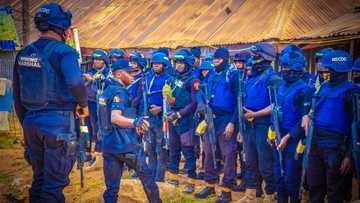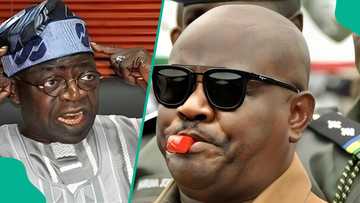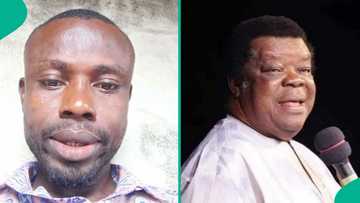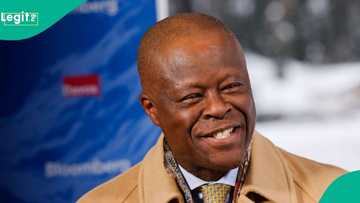Was There Really a Coup Plot in Nigeria? How Two Theories Exposed What the Military Tried to Hide
Editor’s note: In this piece, communications scholar Dr. 'Toks Oguntuga takes readers inside the Defence Headquarters’ statement on the alleged coup plot in Nigeria. He shows how the military’s own language quietly revealed what it tried to keep hidden.
It started from a WhatsApp post on the October 18, 2025. Someone had shared, in a group I belong to, a news report about an alleged coup plot in Nigeria. I was furious with the person and rebuked him for sharing such a sensitive report without verifying it. His response was,
“But it’s all over the media space!”
“Which media?” I retorted.
And without waiting for him to tell me which, I went searching.
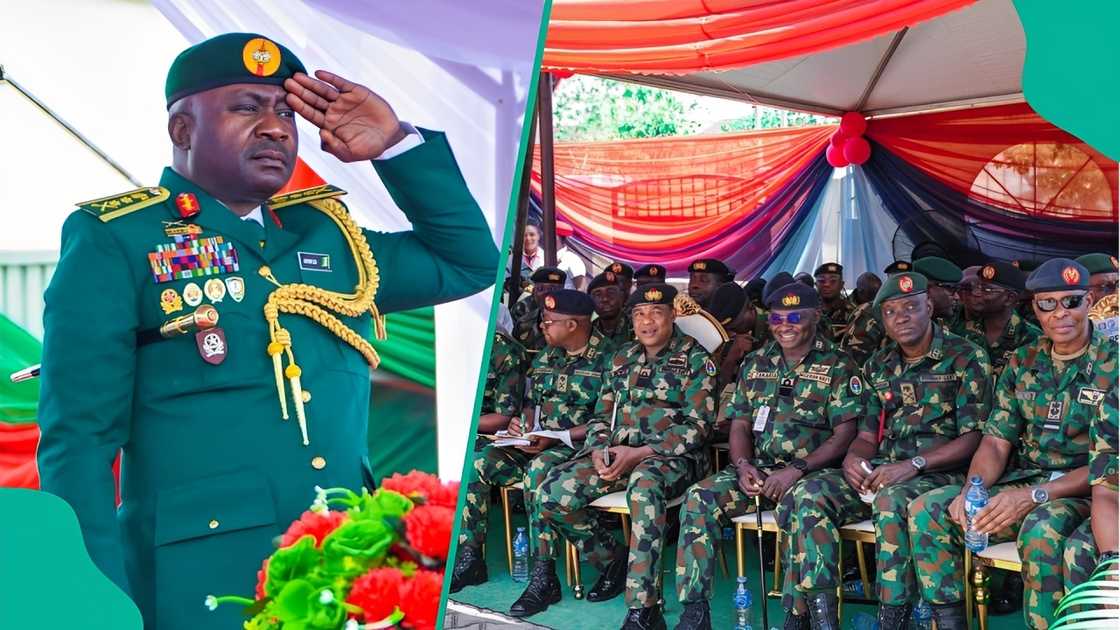
Source: Twitter
Alas, it was the notorious SaharaReporters online news blog. I checked other mainstream media outlets, and there was nothing on the story yet. But in the report posted by SaharaReporters, it was mentioned that the Defence Headquarters (DHQ) had earlier reported the arrest of 16 officers for acts of indiscipline, and the news blog claimed they were actually arrested for a coup plot rather than for the reasons stated in the press release.

Read also
2027 Election: Strong APC grassroot chieftain, Egunjobi, unveils secret behind latest defection
Given SaharaReporters’ proclivity for sensationalism and, at times, the publication of outright falsehoods, I went searching for the press release from the DHQ. I didn’t have to search for long before I found the press release in question on their X handle.
With the headline Sixteen Officers to Face Military Justice for Indiscipline and Breach (sic) of Service Regulations, I settled down to read the press release with the curiosity of a sleuth and the precision of a surgeon. I read it once, then again this time, not merely to grasp its surface meaning but to eavesdrop on what lurked between its lines. From the first paragraph to the last, I discerned that language, that ordinarily dutiful and disciplined servant of power, had mutinied against its masters at the DHQ.
There are moments when language, usually loyal, obedient, and predictable, commits treason. Words, those seemingly docile soldiers of communication, sometimes revolt, deserting the camp of propaganda to join the army of truth. They betray intentions, expose subtexts, and unveil what officialdom strives to bury beneath euphemism and bureaucratic polish. Such was the fate of that DHQ's press release issued on October 4, 2025.

Read also
Lady shares what triggered 'beef' between VeryDarkMan and Chinese businessman Ross, people react
When later revelations vindicate what an institutional text once sought to obscure, the analyst’s burden is no longer to merely interpret language but to interrogate silences, hesitations, and rhetorical hedges, the nervous tremors of an anxious institution. It is here that two formidable instruments of language excavation: Critical Discourse Analysis and Pragmatics (Speech Act) Theory become indispensable. They serve as the twin lenses through which one can decode the unspoken confessions embedded within the DHQ’s press release.
Let me quickly explain the two theories as if describing them to a 10-year-old. Critical Discourse Analysis (CDA) is like being a detective who listens carefully to how people use words, not just what they say, but why they say it that way. The core idea behind it is that language is not neutral; it produces and sustains power relations and social realities. It helps us find out if someone is trying to sound powerful, control others, or make some people look good while making others look bad. So, CDA looks at the hidden meanings and power dynamics inside everyday language, like how a government, teacher, or news anchor might use words to influence how we think. For instance, a government’s crisis statement might frame “security operations” to mask state repression.
Pragmatics (Speech Act Theory), on the other hand, is built on the idea that meaning isn’t just what is said but what is meant, the intention behind the utterance, and how context shapes interpretation. Pragmatics helps identify implicatures, presuppositions, and speech acts that carry hidden insinuations. For example, the statement “We have nothing to hide” presupposes that people think there is something to hide. This theory is ideal for uncovering subtle manipulations in communication.
Let’s now return to the DHQ's press release through the twin lenses of these theories, this time, reading it against the grain of what we now know: that the “sixteen officers” were, in fact, coup plotters.
Discourse Analysis (Foucault, Fairclough, Van Dijk)
A. The Power of Naming and Renaming
There has been a flurry of denials from the presidency and DHQ itself. The DHQ claims it never used the words “coup,” “treason,” or “subversion” in a subsequent press release it issued after more mainstream media outlets reported the story.
But in the initial press release reporting the arrest, the DHQ had named the event as: “issues of indiscipline and breach of service regulations.” Interestingly, this discursive substitution is not neutral. It represents a strategic euphemization, a linguistic dilution of a grave national offense into an internal matter of discipline. In Foucauldian terms, it is an act of discursive control: by defining the problem, the DHQ controls the narrative space within which it can be discussed.
Hidden indication of coup anxiety
The very need to rename such a grave infraction implies that the institution feared the political and psychological shockwaves the word “coup” could unleash.

Read also
Senator Natasha makes major prescription for Nigeria's solid minerals sector, "we must be careful"
B. The “Routine Exercise” Clause: A Cloak for Crisis
The phrase: “A routine military exercise has resulted in the arrest of sixteen officers…” is an astonishingly defensive formulation. No ordinary “exercise” leads to arrests. The lexical pairing of “routine” and “arrest” creates a semantic tension, an unnatural coupling meant to tranquilize public perception. In discourse theory, such a contradictory collocation signals strategic concealment, language engineered to diffuse alarm while hiding magnitude.
Hidden indication of coup plotting:
By insisting on routine, the DHQ betrays two fears. Its fear of being seen as doing something unusual and its fear of being seen as unstable, a fear only explainable if what occurred was destabilizing enough to threaten regime continuity. And the truth be told, there is nothing usual or routine in arresting 16 officers. Sixteen officers and not one single rank and file? It not only reeks of suspicion, but it also beggars belief.
C. Ideological Self-Legitimation
The text repeatedly invokes phrases such as “professionalism,” “discipline,” “loyalty,” and “constitutional authority.” In critical discourse analysis, repetition of legitimating tropes in the absence of external accusation signals internal insecurity.
It is as if the institution were arguing preemptively with a phantom accuser, the public suspicion it anticipates.
Hidden indication:
The over-insistence on loyalty and constitutional subservience suggests that the institution was battling internal disloyalty. The discourse reveals what it is most afraid of: insubordination at the highest level.
D. The Silencing of Context
Notice how the text says: “Investigations have revealed that their grievances stemmed largely from perceived career stagnation…” This statement is deceptively revealing. It provides just enough motive (career stagnation) to humanize the offenders but not enough detail to contextualize the scale of their dissent. In discourse terms, this is controlled leakage, a way of hinting at a grievance big enough to explain unusual behavior, yet small enough to remain “manageable.”
Hidden indication:
The DHQ unintentionally discloses that the arrested officers were organized around shared grievance, a classic precondition for coup mobilization.
E. The Denial Syndrome
Finally, the statement declares: “These actions are strictly disciplinary in nature…” This explicit denial, when unprovoked by any public accusation, is discursive overcompensation. In crisis communication, denial without prompt is diagnostic of what the institution knows but dares not say.
Hidden indication:
By racing to define the action as “strictly disciplinary,” the HDQ reveals its preemptive defense against a more dámnìng truth that the breach was political and systemic, not merely administrative.
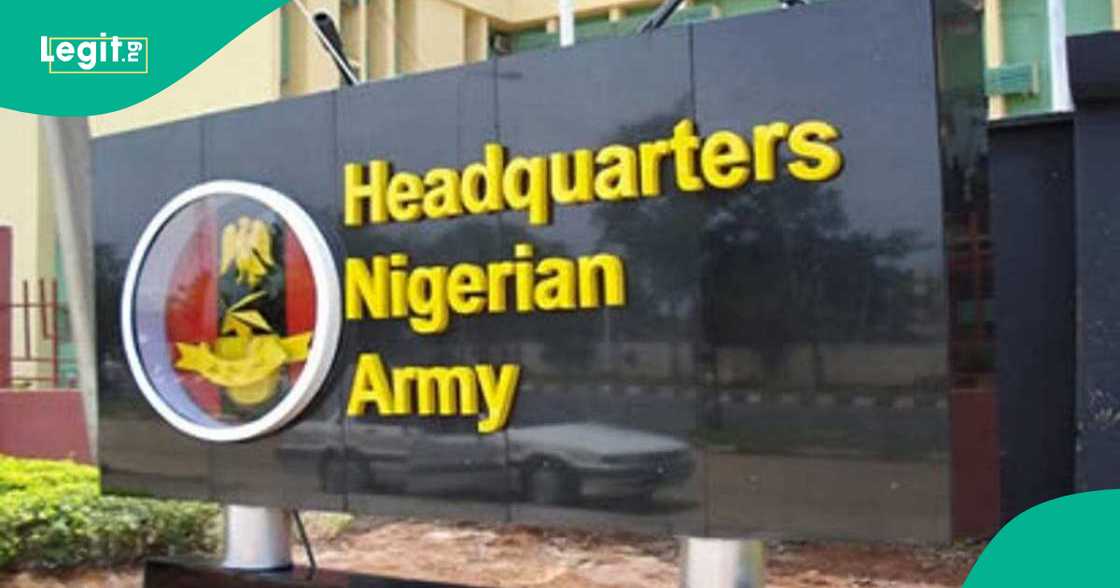
Source: Twitter
Pragmatic Analysis (Austin, Searle, Grice)
Now let’s examine the speech acts, implicatures, and presuppositions embedded in the HDQ text.
A. Speech Acts
Locutionary act: This is the literal act of saying something: the actual words, grammar, and meaning used in an utterance. In the DHQ's press release, the locutionary act is,
“We arrested sixteen officers for indiscipline.”
Illocutionary act: This is what you intend to do with those words, your communicative purpose or function. In this context, the DHQ's illocutionary act is,
"We are in control; there’s no threat to national stability.”
Perlocutionary act: This is the effect you want your words to have on the listener, how they respond or what action they take as a result. Here, the DHQ planned effect is,
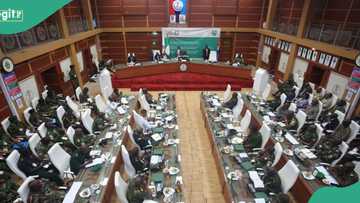
Read also
Anti-terrorism: Defence headquarters open up on why Nigerian soldiers are yet to get their allowances
“Do not panic; trust the system.”
If the arrests were truly routine, such reassurance would be unnecessary. Hence, the illocutionary force (reassurance) reveals that the speaker senses a potential perlocutionary risk (public fear of instability).
Hidden indication:
The act of “reassurance” betrays awareness of instability, which aligns perfectly with the later revelation of a coup attempt.
B. Conversational Implicatures (Grice)
Grice’s maxim of quantity (say neither too little nor too much) is violated here. The DHQ says too much on some points and too little on others, a pattern symptomatic of linguistic anxiety.
- Too much: “Strictly disciplinary in nature” (overjustified)
- Too little: “Routine exercise” (underexplained)
This violation creates an implicature. Something more serious occurred, but the institution is toning it down.
C. Presuppositions
When the DHQ says, “The Armed Forces will not tolerate behavior that undermines the integrity of the institution or threatens its constitutional role…” it presupposes that such behavior has already occurred. The syntax (“will not tolerate”) acknowledges the presence of a threat, what Grice would call an indirect admission through presupposition.

Read also
InDrive releases statement after passenger alleges driver invited thugs to rob her, police react
Hidden indication:
By presupposing the existence of a threat to constitutional order, the DHQ unconsciously affirms the essence of a coup plot.
D. Performativity of Reassurance
The closing sentence: “The Armed Forces… will remain professional at all times,” is a performative utterance, not describing a state of affairs but trying to bring it into existence by saying it. In Austinian terms, such performativity often surfaces when an institution’s professionalism is in question.
Hidden indication:
The performative tone (“will remain”) betrays an awareness that professionalism had already been compromised, which is consistent with a coup scenario.
Synthesis: What the Text Really Gave Away
Though cloaked in bureaucratic calm, the DHQ's press release inadvertently leaked signs of extraordinary anxiety and institutional self-defense. Its avoidance of the word “coup” was a discursive strategy of containment. Its overuse of “loyalty” and “constitutional authority” reflected an internal crisis of allegiance. Its preemptive denial of political motive was a pragmatic signal that a political motive existed. In effect, the text was a linguistic cover operation, one that betrayed its secret by how strenuously it tried to conceal it.
Final Diagnosis
When read through Discourse Analysis and Pragmatic Analysis, the DHQ's press release contains clear linguistic fingerprints of coup anxiety, suppression of dangerous vocabulary, defensive overcommunication, self-legitimating tropes, and performative reassurances; all of which, in hindsight, were discursive smoke from the fire it sought to hide.
Every word of that press release was drafted to reassure, yet every sentence trembled with the pulse of containment. The Armed Forces sought to appear as the unshakeable sentinel of constitutional order, but its language betrayed the anxiety of an institution suddenly unsure of its own loyalty base. The subtext whispered what the text denied: there had been a fracture within the brotherhood of arms; a secret that the Armed Forces tried to bandage with rhetoric.
And so, even before the media unmasked the truth, the truth had already spoken in the DHQ’s own words. Its true achievement was not in concealing the coup but in dramatizing the psychology of concealment, the fear of institutional shame, the dread of public panic, and the desperate hope that language might bury a scandal. But language, ever the double agent, refused to cooperate. In the end, the Armed Forces of Nigeria tried to keep the public calm. Yet, by its very phrasing, it told the nation everything it needed to know: that something far more serious than “indiscipline” had erupted within its ranks. Language, like a restless soldier, refused to obey.
Toks Oguntuga holds a PhD in Presidential Crisis Rhetoric and brings over ten years of experience navigating complex political and communication landscapes. He is an accomplished academic researcher, skilled in strategic communications, political analysis, and speechwriting.
Disclaimer: The views and opinions expressed here are those of the author and do not necessarily reflect the official policy or position of Legit.ng.
Source: Legit.ng


